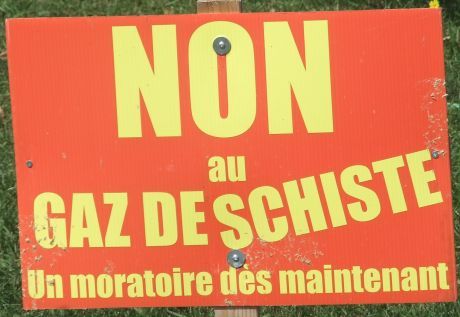Features
You are here
A primer on Quebec’s oil and gas turnaround

March 1, 2014
It’s as if suddenly, just a few months ago, Quebec suddenly realized it had struck oil. And this despite making real progress over the past decade in renewable energies, sustainable transportation and mass transit.
How did we get here? Three interconnected strands will help better understand the public conversation on oil and gas in Quebec over the past few years.
Anticosti Island
Hydro Quebec’s oil and gas division owned the exploration rights for this pristine island in the Gulf of Saint Laurence, until 2007/2008. They sold them to two private companies, Junex and Petrolia. Less than a year later, the companies announced they had found oil, now estimated at about 40 billion barrels (potential gross revenues in the hundreds of billions). Evidence suggests that Hydro Quebec may well have known there was oil on Anticosti, before ceding the rights. Former Hydro Quebec geologist and head of oil exploration until 2006, Peter Dorrins, and former Hydro Quebec CEO André Caillé, found themselves elected to the board of Junex in 2008.
Indignation was heightened by the regular reporting on exactly how much the private companies were paying for their development rights: Junex, with an estimated 30% of the find, were paying 9440$ a year (10 cents a hectare) for the exploration rights. A secret deal with Hydro meant the private companies would have to pay something, if oil was found, but we had to wait until September of 2013 to find out exactly what. The answer was disappointing. On September 6, many months after the Parti Quebecois had been in power, Le Devoir reported that Junex would pay Hydro Quebec only 3 per cent in royalties, should they move to production.
Pressure was mounting for change.
Mining Act reform
Richard Desjardins, a Quebec documentary filmmaker and folksinger, is as close to a hero as you can get in Quebec for his 1999 film Erreur Boreale about Quebec’s forestry industry.
In 2011, the NFB released his new collaboration with Robert Monderie, Trou Story about Canada’s mining industry, alongside an interactive website that illustrates how Quebec’s Mining Act works. Enter your postal code and explore just how much power mining companies have to destroy pristine countryside, small towns, even inner city neighbourhoods with this 19thC law that gave huge powers to private companies.
Portraying the history of mining and its ravaging effects on the environment and workers, the film appeals to Quebeckers to reform the Mining Act and reclaim control over our natural resources. « Il est enfin temps de se réapproprier notre sous-sol!! » reads the press release : “It is time to reappropriate our basement!”
Much ink has been spilled in Quebec over the past few years, some directly addressing reforming the Mining Act : dozens of newspaper editorials, much public debate, hefty tomes (Normand Mousseau’s Le defi des ressources minieres (2012), Alain Denault (et al) Paradis sous terre (2012), to mention but two) have accompanied the several efforts to modernize the Mining Act, since 2010.
Bills 14 and 79, both efforts under Jean Charest to reform the Act, were defeated, and the most recent effort undertaken by Minister Martine Ouellet suffered major revisions before finally being adopted on December 10, 2013. Minister Ouellet is considered one of the environmentalists in Pauline Marois’s government, but the forced compromises left many environmentalists cold.
Maitre chez nous 21E Siecle
No overview could be complete without mentioning this group that had been active for many years, until recently. Daniel Breton, former Green Party activist, currently PQ deputy and briefly Environment Minister in this minority government, was the spokeperson for this coalition that adopted a detailed manifesto on Quebec’s energy independence. The manifesto’s title echoes one of the slogans of the Quiet Revolution: “Masters in our own house.”
Breton garnered lots of attention and credibility for his work in this nationalist spearhead, bringing together different brands of Quebeckers under a common banner. Some $14 billion is spent on imported oil, in Quebec, annually.
Then Liberal Minister of Natural Resources, Nathalie Normandeau, responded on March 14, 2011 to the manifesto by saying that it was not the job of the government to take risks in the exploitation of our natural resources. The preferred path, for her, would be via « partnerships ».
And back to Anticosti?
In February of 2014, the PQ government announced joint ventures with those private companies allowing them to jointly exploit Anticosti Island and offshore oil and gas potential. Some $100 million in public investments were announced. Quebec is going into business, big time, in the exploitation of its oil potential.
But could it be that this is just a manufactured gold rush with no gold? Some pundits and ecologists maintain that there is in fact little or no oil under Anticosti.
In the end, what matters is that the “turnaround” can be turned around, like it was in the St. Lawrence Lowlands, where popular opposition to shale gas fracking forced the PQ into a moratorium. The same can be true for Anticosti.
Section:
Topics:










